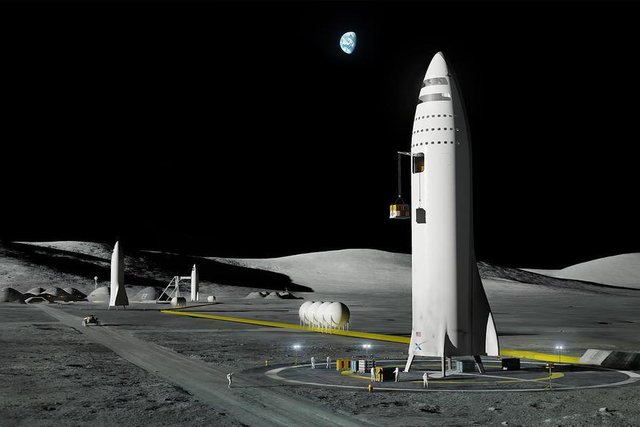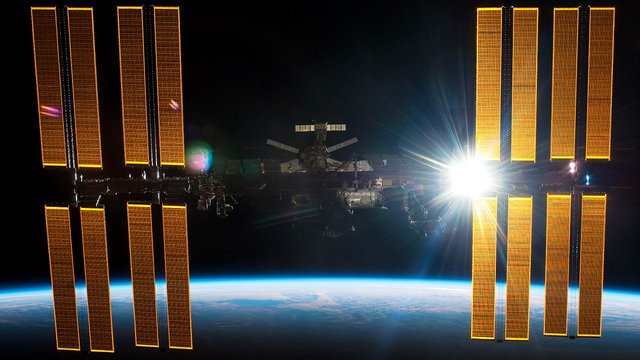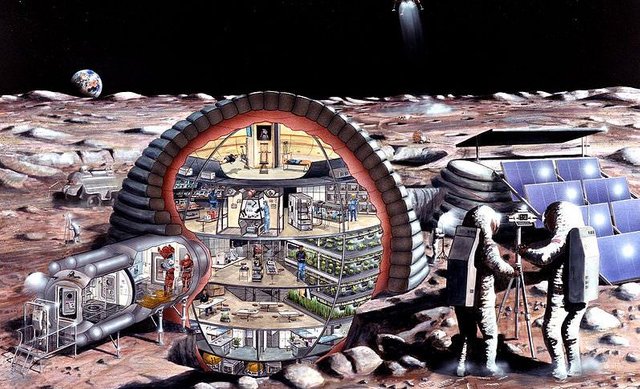Why the Moon? Why Not Mars? SpaceX Shifts Sights Closer to Home
If you pay attention to the aerospace world, you've probably noticed rhetoric has shifted away from being bullish for a Mars colony in the near future towards the establishment of a permanent base on the Moon. Why? What changed? Trump, mostly.
Republicans have a long history of favoring a Lunar base over exploring or settling Mars (Newt Gingrich most famously), perhaps because of the obvious military high ground advantage represented by a potential missile base on the Moon. But in fact there are a few compelling practical reasons to target the Moon before Mars.
As a basis for comparison, consider the ISS. It comes under fire frequently by people who don't understand the value it represents. To our detriment, Hollywood scifi creates an inflated idea in the public's head of how advanced spaceflight technology actually is.
When the average joe sees starship battles and terraformed planets in every other scifi film it's easy to understand how they buy into conspiracy theories that the government has secret offworld bases and antigravity spaceships. Because of the false impression movies have given them, they can't believe spaceflight technology hasn't come further by now.
In reality, manned spaceflight is hard. Very, very hard from an engineering standpoint. Prior to the ISS or even MIR, there were plentiful depictions of multi-module spaceships and space stations in science fiction, but nobody had ever actually built one. It looked as if it was already figured out on paper, but nobody had actually made it work.
The problem, as ever, is not the known unknowns. It's the unknown unknowns. Problems inherent, in this case, to not just the construction but long term operation and maintenance of an unprecedented type of spacecraft or habitat which nobody knows about going in.
The value of the ISS was that it served as a testbed and learning experience. What sort of problems do multi-module spacecraft and habitats develop over time? How do you safely repair them without compromising the interior conditions?
The ISS, being in low Earth orbit, could be evacuated if need be. A multi-module base on the Moon, however, can't be evacuated. We needed to know how a permanent habitat on the Moon, assembled module by module, could be sustained over decades without any interruptions to its habitability.
We now have ample experience (rather, NASA does) with long term occupation, operation and maintenance of modular, expandable space habitats thanks to the ISS. This is experience that is directly applicable to a Lunar base. But why a Lunar Base? Why not go straight to Mars?
Because, although Lunar bases have been depicted in science fiction films dating back half a century, nobody's ever actually built one. Like the MIR, it will be the first habitat of its kind, and inevitably there will be unforeseeable problems unique to planetary habitats that we will need to learn how to solve.
It's a good idea to learn those lessons on the Moon, which we can quickly return astronauts from if need be, for the same reason that it was a good idea to learn the lessons the ISS taught us in low Earth orbit. So that if everything goes to shit, we can totally evacuate the base.
Hopefully it never comes to that. But if it does, better it should happen on the Moon than Mars, which we can't return astronauts from in a hurry. Then, after we have an ISS level of experience with longterm occupation, operation and maintenance of a Lunar base, we can apply those lessons to a habitat on the surface of Mars.
Nobody wants to see humans on Mars in their lifespan more than me. But I also don't consider the lives of astronauts to be disposable. They are the best of us, and deserve care and consideration when sending them into the unknown. We need at least a decade of experience operating a Lunar habitat continuously before we could safely operate a habitat on Mars.
Stay Cozy!




Whoever controls the moon will control the earth in military terms. new space race is going on
First of all, I would like to point out that the ISS was not the first space station. The Russian space station, Mir, taught us a lot. It was the original test bed that allowed us to learn enough to make the ISS as good as it is. Mir ended up plagued with a lot of problems that taught us how to do things differently on the ISS.
Secondly, as to your article point, that the Moon is just closer, I would say "Why Mars? Why not Venus?" It is actually closer. Although we can land on Mars, we could create a floating city on Venus. Where would you rather live? On Mars, you might have to live underground due to the radiation, or possibly in a rotating habitat that increases the effective gravity to Earth norms. Meanwhile, on Venus, you can't land on the surface, but you could live in a floating city.
No matter where we want to go in the solar system though, a Moon base is a inevitability. We have to make one. If we are to begin asteroid mining, the moon is a perfect place to build factories for producing goods that would either be imported to the Earth, or used in space. Such goods might include ships, or ship parts. Due to the extremely low gravity, it would be relatively easy to then move ships into Earth orbit, when compared to launching them from Earth. While we might eventually have factories near the asteroids that make certain goods, we would have to reinvent everything to work in zero gravity. On the moon we at least have some.
It is also the closest place where we can make a colony. We could use it to work on technology for large rotating habitats that are built on a planet's surface. Unlike space stations, rotating habitats on planets are more cone shaped, since you simply need to increase the gravity. We need such technology if we are going to make long term colonies on other planets.
This comment is already too long. I hope we make colonies on the moon, but I hope it doesn't delay colonies on Mars, and yes, even Venus.
The article does not include that claim. A second reading will reveal that I included the qualifier "multi-module" which distinguishes ISS and MIR from prior space stations. You may also notice during your second reading that the article already points out that MIR predated the ISS.
Man, how did I miss that.
I mainly meant to point out how much Mir contributed, but I guess you kinda alluded to that when you mentioned it in reference to the moon colony being the first colony.
We probably do need a closer first colony, because we don't want it to become like the floating petri dish that Mir became.
My current project at work is for the manned mission to Mars, so I can't be completely objective, but even I doubt the wisdom of sending humans at this stage. If we concentrated on unmanned missions we could explore the Moon, Mars, and some asteroids with the same budget. The political effect of a manned mission to Mars is huge, but I am in this for the knowledge, not the politics. If the objectives are science, discovery, knowledge, etc. and we ignore politics then it is hard to justify sending humans. They are weak, fragile, expensive, unreliable, heavy, and wasteful.
The romance of sending humans to Mars is undeniable, though, isn't it?
The ISS and other space habitats so far have enjoyed the protection of Earth's magnetic field within the Van Allen radiation belts. Moving out further presents considerable challenges from solar flares, coronal mass ejection events, and extra-solar cosmic radiation storms.
I've dreamt of exploring the moon all my life. Still do. The incredible high resolution lunar mapping images have of course fueled those dreams immensely.
One of the wonders those lunar orbiter images reveal are the many very large lava tube caverns that already exist, essentially ready-made radiation shelters within which lunar habitations might be constructed.
With present technology and with the vast amount of experience we've accumulated over the years "locally," the moon would indeed make a very logical and accessible next step.
A very long time ago, Gerard K. Oneill and his graduate students performed some amazing studies and created a fabulous set of proposals for how the moon could be exploited as a source of raw materials to build space habitats at the L5 LaGrange point. These were ultimately published by NASA and you can see a PDF of the final publication here.
Mars would be a wonderful adventure as well, but it would undoubtedly be wise to gain more experience locally.
Thanks for your thoughtful article. See you on the moon. ;)
😄😇😄

Indeed, I've written about that before. It's "less sexy" than large surface bases made of prefabricated modules sent from Earth, but also an order of magnitude less expensive per cubic foot of shirtsleeves habitable interior space.
Alex - 'It's a good idea to learn those lessons on the Moon, which we can quickly return astronauts from if need be'
Here you explained it well.... I was curious why Lunar, all dreamed about Mars.... Now I got the point.... It's exactly a good idea.... Nice & well informative article you provided to us....
To get more audience, I wish to ReSteem your post.
+W+ [UpVoted & ReSteemed]
@alexbeyman,
For me US intention to colonized on Moon to build a supreme power against their rivals at earth! You know what I mean by it and they still work on that 1960's - 1980's plans!
Cheers~
It makes perfect sense to start close to home and gradually move outward as you learn. The whole concept of space exploration is an exciting one! Great write up.
It makes a lot more sense to make a small base in the moon. Of course, the mars gesture is a lot bigger. Is conflicting. If given the choice with personal wealth, mars; public funding moon.
Although, It reminds me of the time machine. When they exploded the moon.
But what if there ARE secret space craft? as well as ET beings opperating through our governments and secret societies? What if, just like there is a mainstream government and shadow government, there is a mainstream space exploration program and a shadow one?
What if what weve depicted in movies actually does exist?
What if there is a tonne of information on this subject that neither of us have access to, and still a lot that we do?
What if up is down, black is white, hats are sentient and clocks cause time to move forward? Ooga booga wololo?
What if what weve depicted in movies actually does exist?
very needed post.
thanks for information.